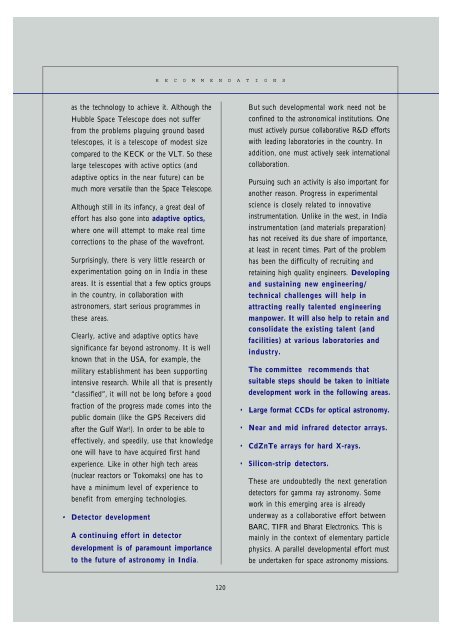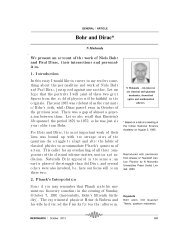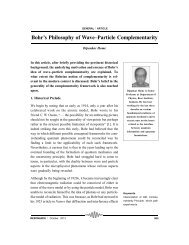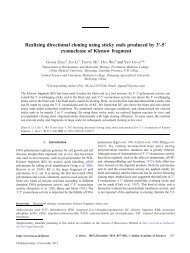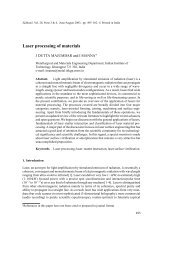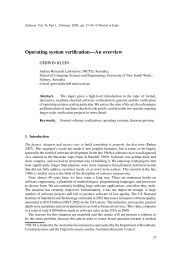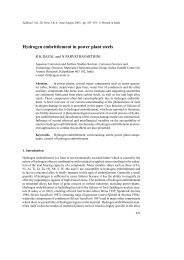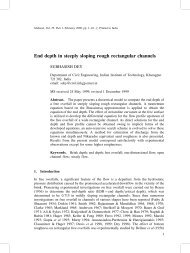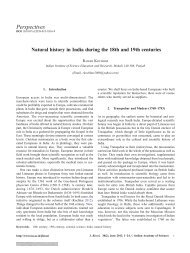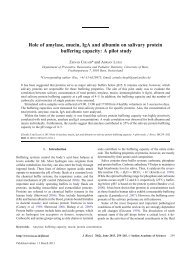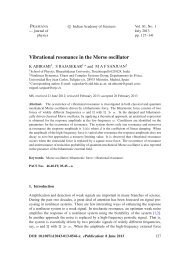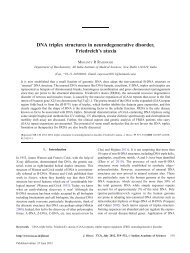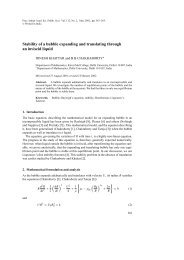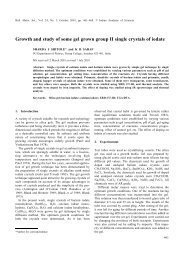2004 ASTRONOMY & ASTROPHYSICS - Indian Academy of Sciences
2004 ASTRONOMY & ASTROPHYSICS - Indian Academy of Sciences
2004 ASTRONOMY & ASTROPHYSICS - Indian Academy of Sciences
You also want an ePaper? Increase the reach of your titles
YUMPU automatically turns print PDFs into web optimized ePapers that Google loves.
RECOMMENDATIONS<br />
as the technology to achieve it. Although the<br />
Hubble Space Telescope does not suffer<br />
from the problems plaguing ground based<br />
telescopes, it is a telescope <strong>of</strong> modest size<br />
compared to the KECK or the VLT. So these<br />
large telescopes with active optics (and<br />
adaptive optics in the near future) can be<br />
much more versatile than the Space Telescope.<br />
Although still in its infancy, a great deal <strong>of</strong><br />
effort has also gone into adaptive optics,<br />
where one will attempt to make real time<br />
corrections to the phase <strong>of</strong> the wavefront.<br />
Surprisingly, there is very little research or<br />
experimentation going on in India in these<br />
areas. It is essential that a few optics groups<br />
in the country, in collaboration with<br />
astronomers, start serious programmes in<br />
these areas.<br />
Clearly, active and adaptive optics have<br />
significance far beyond astronomy. It is well<br />
known that in the USA, for example, the<br />
military establishment has been supporting<br />
intensive research. While all that is presently<br />
“classified”, it will not be long before a good<br />
fraction <strong>of</strong> the progress made comes into the<br />
public domain (like the GPS Receivers did<br />
after the Gulf War!). In order to be able to<br />
effectively, and speedily, use that knowledge<br />
one will have to have acquired first hand<br />
experience. Like in other high tech areas<br />
(nuclear reactors or Tokomaks) one has to<br />
have a minimum level <strong>of</strong> experience to<br />
benefit from emerging technologies.<br />
• Detector development<br />
A continuing effort in detector<br />
development is <strong>of</strong> paramount importance<br />
to the future <strong>of</strong> astronomy in India.<br />
But such developmental work need not be<br />
confined to the astronomical institutions. One<br />
must actively pursue collaborative R&D efforts<br />
with leading laboratories in the country. In<br />
addition, one must actively seek international<br />
collaboration.<br />
Pursuing such an activity is also important for<br />
another reason. Progress in experimental<br />
science is closely related to innovative<br />
instrumentation. Unlike in the west, in India<br />
instrumentation (and materials preparation)<br />
has not received its due share <strong>of</strong> importance,<br />
at least in recent times. Part <strong>of</strong> the problem<br />
has been the difficulty <strong>of</strong> recruiting and<br />
retaining high quality engineers. Developing<br />
and sustaining new engineering/<br />
technical challenges will help in<br />
attracting really talented engineering<br />
manpower. It will also help to retain and<br />
consolidate the existing talent (and<br />
facilities) at various laboratories and<br />
industry.<br />
The committee recommends that<br />
suitable steps should be taken to initiate<br />
development work in the following areas.<br />
• Large format CCDs for optical astronomy.<br />
• Near and mid infrared detector arrays.<br />
• CdZnTe arrays for hard X-rays.<br />
• Silicon-strip detectors.<br />
These are undoubtedly the next generation<br />
detectors for gamma ray astronomy. Some<br />
work in this emerging area is already<br />
underway as a collaborative effort between<br />
BARC, TIFR and Bharat Electronics. This is<br />
mainly in the context <strong>of</strong> elementary particle<br />
physics. A parallel developmental effort must<br />
be undertaken for space astronomy missions.<br />
120


